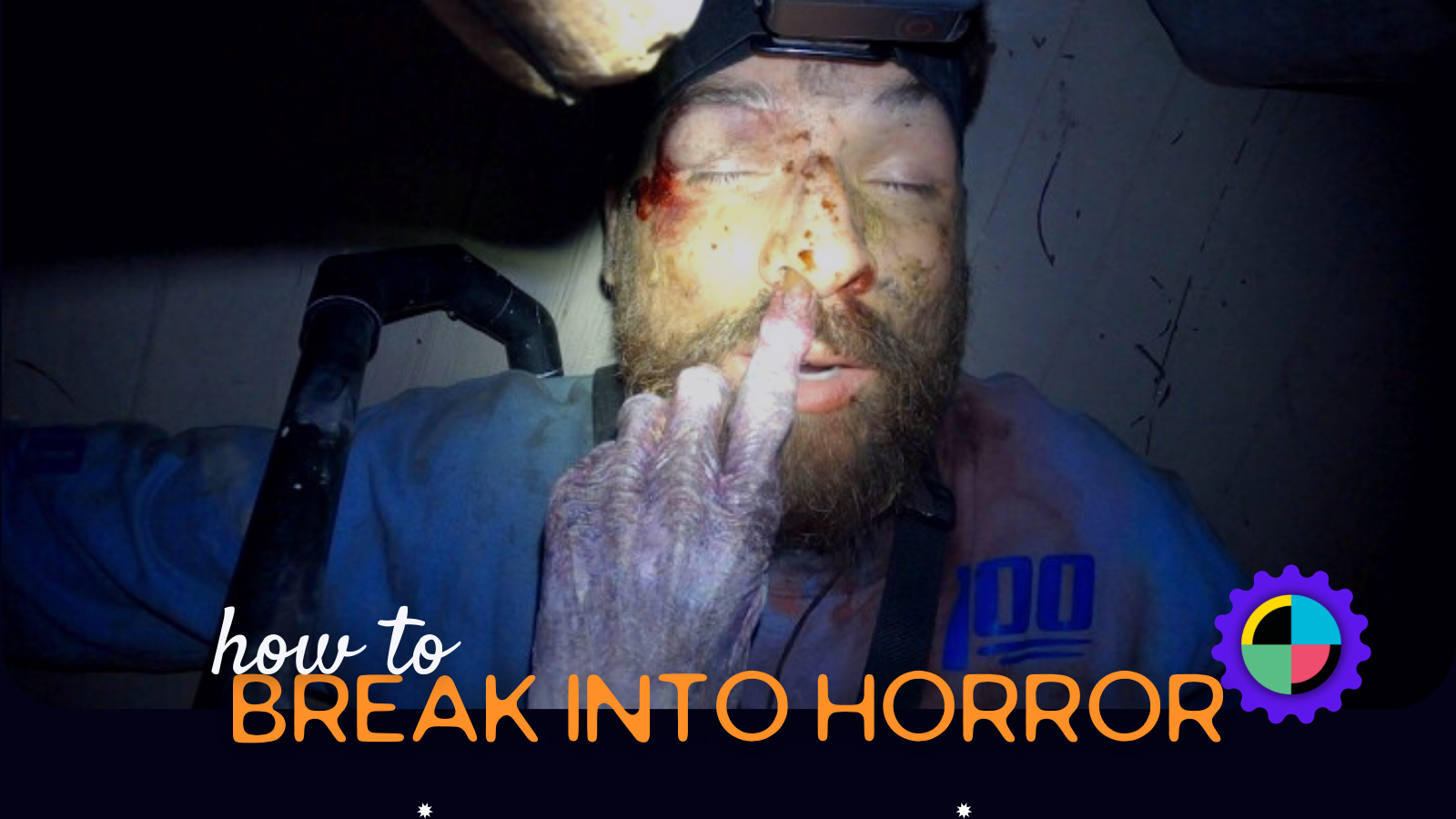
This filmmaking duo's love for horror shines in their creative, creepy, and relentless gem, Deadstream.
Found footage is arguably one of horror’s most divisive subgenres, but the genre is responsible for some of the most iconic modern classics such as The Blair Witch Project and Paranormal Activity. Over the years, the style has changed, and writers and directors Vanessa and Joseph Winter have a few ideas behind the evolution of the subgenre.
As long-time horror fans, the husband-and-wife filmmaking duo set out to create projects that highlighted everything they love about genre film. It’s easy to see the amount of care the duo has for the genre in their first feature, Deadstream, and their segment To Hell and Back for V/H/S/99. For genre filmmakers or fans of horror, Vanessa and Joseph Winter bring an old-school spin on modern horror with practical gore effects and a simple yet experimental story structure.
Vanessa and Joseph Winter sat down with No Film School on Zoom to talk about the process behind their horror projects, working within the found footage sub-genre, and how they got their first feature to debut on Shudder.
Editor's note: this interview has been edited for length and clarity.
No Film School: There's something delightfully campy and horrifying about Deadstream. Did you both envision the story being this type of horror-comedy?
Joseph Winter: From its inception, it was always a comedic piece. Vanessa had the vision of making it truly have some scary moments, but I didn't have the confidence that it could be both. She pushed for that, and I think it's been surprising to see how many people have said that it's actually scary on top of being funny. That's been satisfying to see.
Vanessa Winter: I always say that I got excited about the idea once there was an exploding head in it, and that kind of determined the tone for me.
NFS: What turned both of you towards horror or writing genre stories?
Joseph Winter: We both have a true passion for genre in general. Halloween and horror were part of my entire life as long as I can remember as the number-one thing I lived for, honestly, no exaggeration, and so it was a no-brainer. Then, knowing that Vanessa had the same sensibilities, that's what we naturally wanted to do. It made a lot of sense. We planned to stay in the horror genre at least for a long time, then maybe branch out at some point to horror-adjacent kinds of stuff, but horror is our passion.
Vanessa Winter: Yeah, I don't think we ever even thought about doing something else.
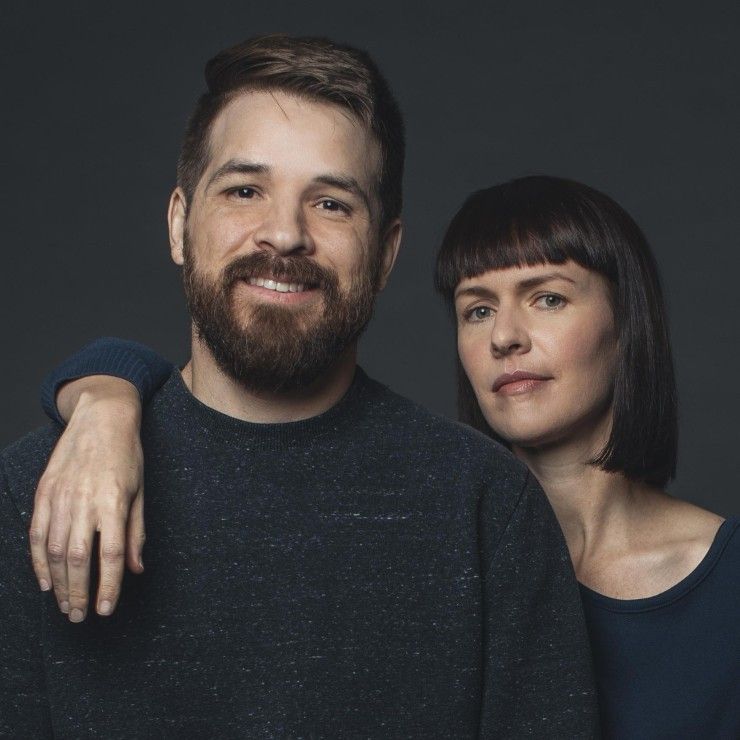
NFS: How do you find that perfect balance between those funny moments and then those more horrific scenes?
Vanessa Winter: It was a lot of trial and error. I don't feel like an expert. We kept messing with it in the scripting process. We read it out loud with our friends, got their feedback, then started doing some rehearsals. Even on set, we were kind of still messing with it, and then, in the edit, we messed with it quite a bit. We used ADR to take out some jokes and try to push some things scarier. I think it had to be more scary than funny. I think it started as a comedy first, then we tried to put in as much horror as we could.
Joseph Winter: You'd watch Deadstream and probably not believe that we trimmed jokes, but we did. I think pruning jokes when it's that joke-heavy is only going to help the comedy. There was joke fatigue in the test screenings that we did. We thought certain scenes were hilarious to us and no one laughed, so we would go in and prune that. It helped the comedy and the horror.
Vanessa Winter: There are some scenes that I wrote in the script that I imagine being really scary, and they're just kind of like eh in the movie. Luckily, enough of them work. Same with the jokes that seem to be landing with some people.
NFS: I think there's some humor in outrageous deaths like the officer’s death by potato gun and his body sliding down the gun onto Shawn (Joseph Winter).
Joseph Winter: I'm glad that's working because, man, you just don't know when you've got a dummy of a corpse and you're sliding down a barrel of a potato gun, it's like, is this the worst movie of all time? Or is this going to be appreciated?
Vanessa Winter: Yeah, that one felt like a risk.
NFS: The film feels like you are poking fun at the found footage subgenre, but with sincerity. Did you always envision it being this kind of found footage film?
Vanessa Winter: Yeah, it was always found footage. I think pretty early on we got excited about having a ton of cameras strapped to an actor. We thought that there was comedy in having him with a camera pointed at his face constantly. Then, we started to expand things a little bit by coming up with ideas that he could be placing the cameras around the house. I don't know that our intent was ever to poke fun at found footage, but I think it was to go extra with it, like how to find the humor in this character that is an expert in filming himself.
Joseph Winter: We love good found footage movies, and we wanted to pay tribute to them. But at the time when we were first talking about this about five or six years ago, we wanted to do something that we had never seen done in found footage. There were a whole bunch of found footage movies that were made for the wrong reasons, really cheap, and they just weren't good. We could sense a burnout from audiences that they didn't want more found footage, so we were thinking, "What if we did that, but took them in a more cinematic place, more Evil Dead II or something like that, that we hadn't seen at the time?" We were trying to do, "What would be the new take on found footage that would get us excited again?" Since then, there have been other influencer-type of livestream movies, but I wouldn’t say similar necessarily in tone.
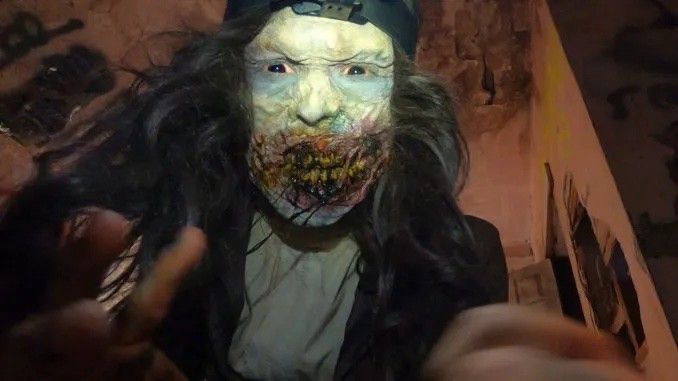
NFS: You also have a segment that you both did together for V/H/S/99. Is there something about this type of technique, the found footage technique, or subgenre that you guys appreciate?
Vanessa Winter: For V/H/S/99, there was a big practical aspect to it where we were brought on late and had a fast turnaround. We brought the technology that we had fine-tuned in Deadstream with the camera rigs and things like that with a crew that we loved with creature design and makeup effects, and we just reassembled everything and shot it that way. In some ways, it was practical for us to do it that way, and in another way, I think that we have sincere love for it
Joseph Winter: In making Deadstream, I think one of our wildest dreams was to be invited to be part of V/H/S if they were to continue it. I mean, that just shows you that we do have a love and respect for found footage, and being invited to a found footage anthology was awesome. Having said that, with the found footage that we've done, you can probably notice a more deliberate cinematic approach where we're breaking rules a little bit in favor of having a more traditional cinematic experience at times by showing the creatures longer than you would normally show in a found-footage movie.
NFS: Most of the effects in Deadstream are practical effects. What was the draw to practical over CGI effects?
Vanessa Winter: I think just the true love for practical effects. I like the way they look on film. I love reading about the behind-the-scenes gore effects and creature effects, so I love it as an art and the texture that it brings to film. I also have a lot of fun filming those parts.
Joseph Winter: For me, special effects, makeup, and creature work was the first aspect of horror filmmaking that I fell in love with as a little kid. As movies started to change the aesthetic towards CG, I hated it. Movies are now having a resurgence of practical effects. I feel at home again with the films that I'm watching, so, naturally, those are the kind of stories that I want to tell. It seems more real to me. If you see someone’s limb get ripped off and it looks real and there's real blood squirting on people, I mean, it just affects me and the audience in a better way than when something is noticeably CG.
Now, having said that, we definitely use some VFX enhancement in our V/H/S/99 segment where practical stuff just didn't work. We had some misfires with blood and so at moments it's augmented. I think that we will continue to do that now because it can be done well. We had a really amazing VFX artist named Justin Martinez. But as far as Deadstream goes, everything in it was practical, and our producer/DP, Jared Cook, had the task sometimes of compositing practical elements together when something didn't quite work. There are two takes in a specific gag I'm thinking of where there was a good aspect to one take and a good aspect to another, so he had to stitch them together. There wasn't any CG use in Deadstream.
NFS: What made you both want to become filmmakers and what were your first steps into directing?
Vanessa Winter: I grew up in a really small town, and working on movies never even crossed my mind. It wasn't until I was in college that I took an intro to film class and then I fell in love so hard. I was like, "This is what I have to do." Then at the very first film set that I was on, I was like, "This is it," so for me.
Joseph Winter: One of my earliest memories is my dad renting The Making of Thriller, and watching these zombies pull latex off of their faces at the end of a shoot and seeing Michael Jackson getting his yellow contacts put in his eyes for his werewolf transformation part just made me feel like, "This is what I was intended to do. Somehow I need to be on that side of the camera creating these things and trying to chase this feeling for the rest of my life." Eventually, that turned into writing stories and making movies with my dad’s video camera. It was just always there as part of my life.
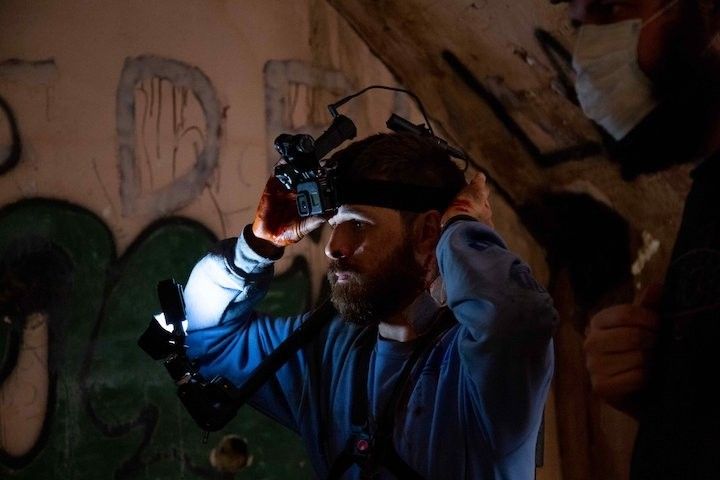
NFS: This is the first feature for both of you as directors. What do you think the key to a great collaboration is between two directors?
Vanessa Winter: Well, it's been kind of a slow process because we've been working together for 10 years and so we've always given each other notes on each other's scripts and helped each other do some rewrites.
Joseph Winter: For us, specifically, in both Deadstream and To Hell and Back, I am the star of both, so most of our decisions as co-directors happen in pre-production. We do extensive rehearsal processes together, and most of the time it's just me and Vanessa fighting it out and figuring it out. By the time we get there, we know what we're going to do. Then, of course, unexpected things happen and we have to sidebar and come up with a solution together.
But on set, I'm in front of the camera and she steps into the role of the director on set where people are supposed to ask her the questions mostly while I'm focusing on the delivery and trying to stay true to what we had decided in pre-production. There's kind of that delineation that happens so far in our films just because I'm at the center of them as an actor.
Vanessa Winter: Yeah. I think one of the benefits that we have as far as being a couple and also co-creators is that because we're so comfortable with each other, we have a comfort level in arguing something out until we find the best version of it. In some ways, those challenges are very fun for us. Even though we may start with a scene that we both have different visions for, I think a lot of times we walk away feeling like that was a better scene than the scene that I came up with.
NFS: The fact that you guys got to premiere your feature on Shudder is pretty great. How did that whole collaboration start?
Vanessa Winter: Oh, Shudder is so great. They were just interested in buying our film.
Joseph Winter: It was because of SXSW. We initially had a festival strategy that involved some smaller but awesome film festivals. Then, we met someone along the way just from cold submitting through FilmFreeway. We met someone along the way who told us that we should withdraw from that plan that we had and aim for some bigger film festivals in the early part of the year. Anyway, we went for it. We got into SXSW by some horror god miracle, and from there, Shudder put in an offer. That made the movie worth way more than it would've been.
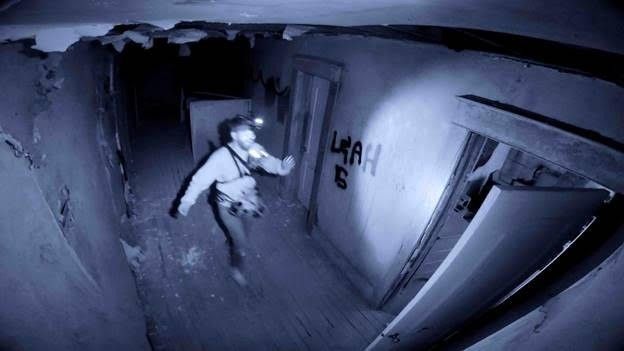
NFS: Is there any advice you want to give to horror filmmakers who are looking to make their first feature?
Joseph Winter: I think everybody has room at one point in their life to open some 0% for 12-month APR credit cards and to just go after it. Go after the thing that you believe in. You get one of those. That's not a sustainable business model, but I would tell people if you have something that you believe in, it's good, but not perfect, good is fine. Go after it with all your heart and whatever resources you have. As you get going, post spoilers on Instagram. If you make horror movies, post your creatures, spoil the crap out of your movie, and get people excited early on. Otherwise, they won't give a shit about it. You have to do that. Then maybe more money can come along the way to help you finish the project.
Vanessa Winter: I also think just making something. I mean, we made a lot of shorts before our first feature, so I would just say go for it and finish it. That can be hard, but just make something and finish it.
That's one of the hardest things for me. I'm a perfectionist, so it becomes so easy to not finish your script because it's not perfect or not finish editing your movie because it's just turned out so-so. I think finding some friends that can help you stick to your deadlines helps, too. Some of the stuff that's helped us the most is this unofficial writers’ group we’ve put together. It’s a group of some friends or writers that we respect, and we'll schedule a day when we're going to read stuff out loud together. It just gives you something to work for or feel some accountability.
Joseph Winter: Yeah, deadlines to work toward where there's accountability on the other end, and that's been helpful to us.
You can watch Deadstream and V/H/S/99 exclusively on Shudder.

Your Comment